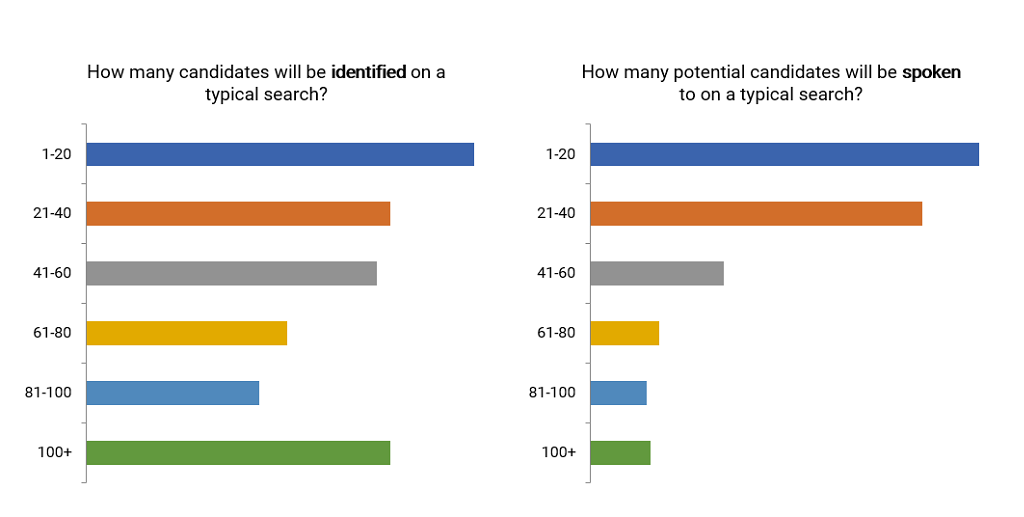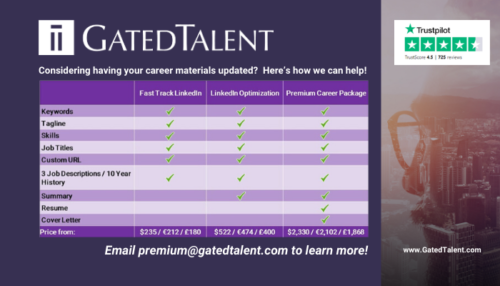An executive job search can be a lengthy process. As you get more senior, there are fewer and fewer opportunities that are likely to be an attractive next step. Meanwhile, the competition for each opportunity gets stronger and stronger. It’s hardly surprising that – from the perspective of the executive – an executive job search can take a year or more. We asked management and executive recruiters at retained executive search firms what advice they would provide to executives looking going through the hiring process.
Here’s what they told us.
An executive job search takes time
An executive search from the perspective of the hiring organization will typically take 90 days, although clearly it can vary. However, from the perspective of an executive, the job hunt can take considerably longer. To take an extreme example – if you plan to be CEO of a Fortune 500 company, then you can expect about 60 opportunities to materialize this year. To be hired, you’ll need to be identified by the recruiter and then be successful through a lengthy interview process where you are up against some robust competitors – often more than 100 of them. The reality is, it can take a year for an executive to get hired for a new leadership role.

Statistically, your odds are not high. As a result, it’s not unusual for a job search for an executive seeking a senior role to take over a year. Recruiter Nick Joly of US executive search firm Hadley, Joly & Associates recruits leaders for major corporations, venture capital owned and family-owned organizations. His view:
“Searching for a new job is a job in itself.”
James Cooper heads Damhurst & Co, an insurance executive search firm in the UK. He agrees, and believes that the executive should manage the process as they would a change process in the context of an organization:
“Manage the search with the same level of analysis and diligence as you would for your employer or when project managing a client.”
Executive recruiter John Jazylo of US search firm Leadership Capital Group has a similar view. He believes you should go as far as producing a written job search plan:
“You wouldn’t embark on a business venture without a written plan so why would you proceed with your career planning without it!”
Executive recruiters on visibility
Executive and management recruiters go out and search for the best executive for the opportunity at hand. Executive recruiters prefer to take a lead on conducting a meticulous search for the best-qualified and suitable candidate. To do this, executive search firms employ specialist researchers who will draw up a long-list of potential candidates for an opportunity. The research process will vary from search to search.
Therefore, executives need to take steps to ensure that when an executive recruiter comes knocking, they are found – while also remembering that they can’t be seen to be looking – executive search happens in private mode for both recruiter and the job-seeking potential candidate.
It’s not just about the internet
In the days before the internet, executive recruiters advised executives to be visible via offline marketing. Speak at conferences. Write for the press. Raise your profile. Today, the focus tends to be on online branding, but the old recommendations hold – doing all of these things will increase your visibility. Headhunters regularly ask for referrals and recommendations from sources, and these steps will ensure you are top of mind. James Cooper at global insurance industry recruiter Damhurst:
“Embed yourself in the communities leading the thinking on emerging trends/products/leadership styles.”
Lorri Lowe of Friisberg & Partners makes the point that this is not something you should be doing exclusively during the job search:
“It is worth taking a long-term approach to building strong, mutually-beneficial relationships with colleagues, peers and key recruiters.
While most people understand the importance of networking, few actually do much about it – despite the fact that it is an effective way to increase your chances of being noticed amongst your peer group and across your industry.”
Dennis C. Miller practices nonprofit executive search, and he concurs:
“Keep track of your achievements. Network in your field. Build strong relationships among your peers and colleagues.”
But being active on LinkedIn and GatedTalent will help
However, there is no question that spending time increasing your executive brand online is a significant part of this process. Creating and curating your brand helps you gain the right kind of visibility from the right kind of people.
Back to Lorri Lowe:
“Having a visible online presence and ensuring that your key skills and achievements are in the public domain means you can be seen and found. Creating a compelling social media profile is very useful. Update or add your most recent and most relevant roles, provide a few details on each and fill in your Skills & Endorsements section with keywords that align with your capabilities and point toward the types of roles you want next.”
One thing to keep in mind – many LinkedIn users assume that “who viewed my profile” will let them know which recruiters have been considering them – generally speaking, it doesn’t tell the full story – even if you have Premium versions of LinkedIn. Recruiters typically use LinkedIn in ‘Private Mode’ and so you’ll rarely know who has looked at you.
The executive brand
To increase your chances of success it’s worth optimizing your LinkedIn profile around the types of opportunities that interest you. If your background is in pharmaceutical leadership roles, you probably don’t expect to be the successful candidate for a CEO role in the investment banking or financial services sectors. Accepting this and building your profile around the positions you might be seriously considered for can improve your success rate immensely.
We’ve blogged extensively on how to optimize your LinkedIn profile and also run webinars for our members on how to do this. We offer a paid LinkedIn profile optimization service if you wish to take advantage of that.
In addition to optimizing your profile around the opportunities you want, it is also important that your LinkedIn activity encourages recruiters to contact you. Engaging on the platform will lead to more visibility, and turning on ‘Open to Opportunities” on your LinkedIn dashboard will have a significant impact on the number of profile views you receive from both recruiters and hiring managers.

However, while it is good advice to use this feature, it is not good advice to use phrases like “actively seeking” on the profile itself. There is data that suggests that this will make you less attractive to an executive recruiter.
John Jazylo recently hosted a coaching webinar for our executive members at GatedTalent and stressed the importance of having career documents that fundamentally all say the same thing. Have a watch:
Will executive recruiters expect a resume?
The executive resume is an important document – but perhaps not quite as critical at the executive level as it is for lower-level candidates. An active candidate seeking an entry-level position will be expected to apply for roles and so needs a strong resume throughout the process. The senior-level executive is typically approached by an executive recruiter. By the stage the approach is made, the recruiter will already be aware of most of the information that your resume will contain. However, there’s no question you will need such a document at some point in your search, and so it is wise to prepare.
Maria Guardans Cambó of Spanish executive search firm Adunas is often surprised by the quality of resumes she sees:
“An executive needs to have prepared and reviewed his/her CV, his/her storytelling, his/her objectives for the future, his/her actual and future interests, his/her reasons for a change. the kind of position he/she would like to be finding in the market.
Some things sound natural and obvious, you could not believe how many executives have not prepared a proper CV!”
Preparing for the Interview process
James Cooper believes that success in an interview depends in a large part of the amount of preparation undertaken:
“Do not go in cold – get used to telling your story, role-play the conversation, video yourself, be aware of how you come across, find a way of hitting the key points in an accurate but relaxed way.
Do your homework – know the regulation, know the company you are meeting, if possible, know the person you are meeting.”
It is a two-way street, be sure to have sensible questions to hand. Try and identify the questions their executives are struggling to answer.”
We’ve done an extensive blog with detailed examples of interview questions and answers, and our premium members have access to several webinars on the topic of job interviews, so I won’t go into too much detail here- but this is a clip from recruiter Leigh Ann Arthur of Dutch executive search firm LAA International.
When do you begin your executive job search?
It’s an unfortunate fact of life that an employed executive is likely to hear of more opportunities than one who is between roles. There are several reasons for this – some are practical: On LinkedIn at least, many recruiters begin “target company” research based on a search for “Company Name” and “Job title” – and that will exclude those without a current position.
There is also the question of employer and recruiter perspectives. Here is Mariana Turanova of Target Executive Search:
“As soon as a top executive, however great a career she has, is seen to be “on the market,” her candidate value decreases rapidly… Potential employers start asking, “why has he/she decided to leave?” “Is there something the market should know about?”.
Mariana recommends, therefore, that the executive begins her search while currently employed:
“Resignation from an existing job should come only after the candidate found a new role, not before!”
This is good advice and leads on to the bigger point that – for the vast majority of executives, there will be a “next step” at some point. It may arrive at the perfect time – but it may not. As a result, even if an executive is not actively looking for a role, it is essential to be visible at all times. As Lorri says:
“In my opinion, it is worth taking a long-term approach to building strong, mutually-beneficial relationships with colleagues, peers and key recruiters. Suddenly being enthusiastic about networking when you need a job never looks genuine!”
What this means is that it’s always wise to take a call from an executive recruiter – or, in the context of GatedTalent, an executive recruiter connection request. Lorri explains:
“If, in the past, however, you have always declined to take calls from ‘recruiters’ then don’t be too surprised if they find your newly-found determination to talk to them a little out of character. It does not hurt to take calls from us, even when you are not actively looking… maintaining a few contacts amongst the better search firms is generally a more productive long-term strategy. Taking the time to communicate is vital – we won’t know you are right for a role if we don’t know you – and this is even more important for C-level positions because these roles aren’t always advertised. ”
Bringing it all together
In short – an executive career change can be a significant and lengthy process. It is one that requires advanced planning and one that is obviously always easier if you do it from a position of strength.
Our final advice to an executive considering how to make a career change? Always be visible. If an executive recruiter can’t find you, or if they don’t know what you are capable of, they won’t contact you.
If they don’t contact you, you don’t get a job offer. It is often as simple as that.
As a result, think about the role you want. Work out what the role requires and how you meet those requirements. Aim to create an executive brand and make it visible always. Optimize your LinkedIn profile. Get a professional CV service to polish your executive resume. Network… and always accept the recruiters call. Prepare for your interviews with some expert executive coaching.
Good luck in your search!
Join GatedTalent Now!
Thank you
We have sent a verification link to your email. Please follow the instructions to activate your account.














